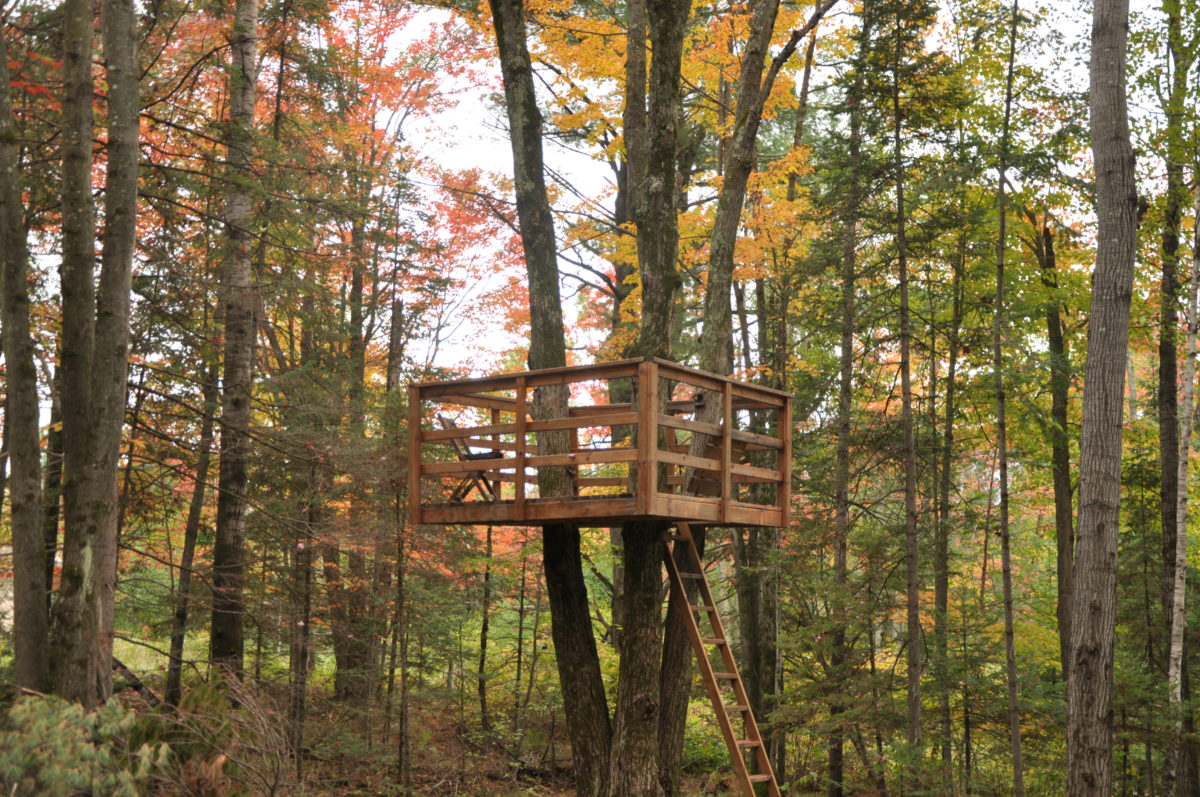Tomorrow begins gun season in the Northwoods. And—for those of you checking in from outside the neighborhood—this is a really big deal!
It’s such a big deal that I like to join in. Like many Northwoodsmen, I have a deer stand. And, during the season, I sit above the forest floor and wait. That I have no license, no purchased tags, and no special equipment is not a problem, because I also have no gun—That’s what makes me legal!
Psalm 104 explains why a man in a tree stand without a gun in gun season is not wasting his time. There’s a lot of nature out there. And, there’s a proper way to respond to nature. It’s not by worshipping the creation (Rm 1.25); it’s by seeing God’s wisdom in creation, and then praising our covenant God of creation.
Wisdom in Creation (:1-23). The first 23 verses of Psalm 104 mirror the Genesis account of Genesis 1-2.3. Day 1, in Genesis … :1-2a, in Psalm 104. Day 2, in Genesis … :2b-4, in Psalm 104. Day 3, in Genesis … :5-9, in Psalm 104. Day 4, in Genesis … :19-23, in Psalm 104. Day 5, in Genesis … :25-26, in Psalm 104. But, Day 6???
God created by His word, separating the elements of creation in Days 1-3, but then filling His creation in Days 4-6. But, the psalmist won’t be predictable or boring. Instead, at the first substantial mention of mankind (:23), the psalmist gives us a twist.
The twist comes right where we’d expect him to suddenly start talking about the wonders of mankind, Day 6. Instead, in verse 24, we get a spontaneous shout of exaltation: O LORD, how manifold are your works! In wisdom have you made them all; the earth is full of your creatures.
Provision for the LORD’S Creatures (:24-32). What does mankind as the chief of all land creatures do in relation to God? These all look to you, to give them their food in due season … When you give it to them, they gather it up; when you open your hand, they are filled with good things … When you hide your face, they are dismayed; when you take away their breath, they die and return to the dust … When you send forth your Spirit, they are created, and you renew the face of the ground.
As it turns out, humankind isn’t dependent on the earth for its existence. Humankind (along with the rest of creation) is dependent on God for its existence! And harmony with creation doesn’t mean that we get in rhythm with the earth. Harmony with creation means that we get in rhythm with the Creator of the earth.
This is the point of the final section of Psalm 104.
Harmony with the LORD of Creation (:33-35). I will sing praise to my God as long as I live … I will sing praise to my God while I have being … May my mediation be pleasing to him, for I rejoice in the LORD.
Notice here that the psalmist, who began by urging himself to praise God (:1a), now concludes his commentary on creation by doing just that. Notice also the little twist about sinners in verse 35: Let sinners be consumed from the earth, and let the wicked be no more!
Far from a “downer” at the end of a beautiful psalm, I take this a yearning for a Redeemer who will, one day, complete the work of redemption. The Apostle Paul, in 1 Corinthians 1.20-25 … :30-31 sees Jesus as doing just that. Where there are sinners at odds with God in His work of creation, there is now Jesus, who is the very wisdom of God:
And because of [God] you are in Christ Jesus, who became for us wisdom from God, righteousness and sanctification and redemption, so that, as it is written, “Let the one who boasts, boast in the Lord” (:30-31).
In the end, wisdom is seeking harmony with the Creator through the redeemer, Jesus!
My response to creation should be praise to the LORD of creation—for His wisdom, His provision, and the harmony He brings about in Christ.
Here’s a few questions to answer in your own tree stand this gun season:
- In contrast to some of the environmentalist language we often hear, what does Psalm 104 teach about our place in nature?
- How does our treatment of creation change once we trust in Christ?
- What keeps Psalm 104 from being a stale recounting of the Genesis account that people already know? Why is it relevant and helpful to us?
- The psalmist, beginning in verse 1, has to push himself to praise God. Why is this hard for us too?

